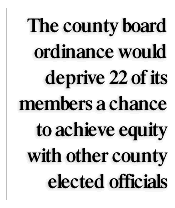Has the Teacher’s Union Taken Over the GOP?
It was not long ago that the state teacher’s union was the designated villain for Republicans. For more than a decade, former Gov. Tommy Thompson demonized the Wisconsin Education Association Council, and did everything possible to depress teacher salaries and hold the line on school spending.
 Contrast that era to the current budget negotiations, where the biggest ticket item, the schools, was simply off limits for any spending cut. Gov. McCallum, Assembly Speaker Scott Jensen (R-Waukesha) and Senate Majority Leader Chuck Chvala (D-Madison) all seem to agree that not one dollar of a potential $1.2 billion budget cut can come from the schools.
Contrast that era to the current budget negotiations, where the biggest ticket item, the schools, was simply off limits for any spending cut. Gov. McCallum, Assembly Speaker Scott Jensen (R-Waukesha) and Senate Majority Leader Chuck Chvala (D-Madison) all seem to agree that not one dollar of a potential $1.2 billion budget cut can come from the schools.
“It’s the biggest story of this budget,” says Mike Theo, executive director of the Wisconsin Realtors Association, a major lobbyist group. “WEAC has scored a phenomenal coup on this budget.”
“We have a problem now in that Chvala, McCallum and Jensen are all doing whatever it takes to get WEAC to help them in November’s elections,” one Republican representative complains. “As long as all three of them are uncritical of school spending, this state’s finances will continue to be among the worst in the nation.”
Jensen’s role is the most surprising. But as he has increased his majority in the assembly, the Republican tent has gotten bigger and it has become harder to cause trouble for old antagonists like WEAC. Jensen, observers suggest, is bargaining that WEAC will not oppose Republican incumbents in some key elections this fall.
Then there is John Stocks, a former state senator in Idaho, who came here to become WEAC’s chief lobbyist. Stocks is a thoughtful analyst of the legislature with a smooth style. “He is, if not the best lobbyist in the state, then damn close,” Theo says.
Add to that the work of Butera’s predecessor, longtime WEAC kingpin Morris Andrews, who now functions as a semi-retired consultant and helped advise McCallum in creating a budget approach punishing local governments rather than the schools. Mayor John Norquist has called this a “devil’s bargain” fashioned by Andrews and the governor.
It was Andrews who helped create connections between WEAC and the realtors many years ago. The realtors are a business group that sometimes opposes the union, but they have much in common. Real estate brokers need good schools, Theo notes. “The first question people ask when they’re going to move is ‘how are the schools?'”
Andrew’s ex-wife Sharon Chamberlain, who runs Chamberlain Research Consultants, is another connection between the two groups. She has done focus group research for the realtors since 1990, and did work for WEAC for years as well. Theo says Chamberlain and Andrews “are both good friends of mine.”
WEAC’s current and past leaders have been strategic in forging connections, but as it turns out, it may have been Thompson who gave them their best break. Thompson’s idea of increasing state aid to schools while cutting back their use of property taxes through a cap on school revenues seemed like a way to limit school spending while increasing state control of education. But Thompson and the legislature also redid the school formula to make it less equalized, meaning property-rich districts got proportionately more than in the past. These districts, of course, are Republican districts, which will now oppose any cuts in the aid. Once funding is given, it becomes very difficult to take it away.
It’s another example of the law of unintended consequences. By short-changing property- poor school districts represented by Democrats, Thompson and the Republicans have created even more support for state aid to schools, which is the prime goal of WEAC. All of which helps explain their amazing victory in this budget go-round.
Defending The County Board
Sources tell me Tom Ament blames the Milwaukee Journal Sentinel for his demise, and that’s not surprising. The paper’s relentless coverage of Ament, once it jumped on the pension story, clearly drove the story and brought him down. But the MJS went overboard in a recent article about the county board.
 Steve Schultze‘s story exposed county supervisors who had so far failed to sign waivers of their enhanced pension. He described the sweetener some supervisors would get as a “25%” increase in their pension, which is factually correct, but very misleading.
Steve Schultze‘s story exposed county supervisors who had so far failed to sign waivers of their enhanced pension. He described the sweetener some supervisors would get as a “25%” increase in their pension, which is factually correct, but very misleading.
The big pension increase going to county employees hired or elected before 1982 affected only three supervisors: Tom Bailey, Rich Nyklewicz and Penny Podell. This group of old timers will gain a 25% increase in their final average salary, if they continue on the job until April 2004. This will allow them to circumvent the county provision that prevents employees from collecting more than 80% of their salary in annual pension.
By contrast, the other 22 supervisors, along with other employees who started after 1982, merely got an increase in their pension multiplier – the annual percent of salary that counts toward their pension. For public officials, it increased from 2% to 2.5%. This is a 25% increase, but it simply brings them up to the same level as all other elected officials who started prior to 1982: 2.5% of their salary for every year worked up to a maximum of 80% of their salary. The other 22 supervisors, in short, cannot circumvent the prohibition against collecting more than 80% of their final average salary.
The only questionable benefit the newer supervisors will get is the option to collect a backdrop. It will never mount up as high for them, because they don’t get the extraordinary 25% increase on top of the 80% of salary that veteran officials receive. But it is still a sweetener other government officials in Wisconsin don’t get, and it is reasonable to ask why the supervisors are not willing to waive this unusual benefit.
Russ For Pres?
Russ Feingold or his supporters have made up campaign buttons reading “Russ in ’04.” Feingold runs for reelection for U.S. Senator in 2004, but that also happens to be a presidential election year. It’s a happy coincidence for that button, which doesn’t specify which office we should vote Feingold into in 2004.
This article was originally published by Milwaukee World.
Murphy's Law
-
Is Legislature Biased Against Working Class?
 Apr 4th, 2024 by Bruce Murphy
Apr 4th, 2024 by Bruce Murphy
-
Associated Press Will Decline in Wisconsin
 Mar 27th, 2024 by Bruce Murphy
Mar 27th, 2024 by Bruce Murphy
-
City Attorney Race Is Vitally Important
 Mar 25th, 2024 by Bruce Murphy
Mar 25th, 2024 by Bruce Murphy
















